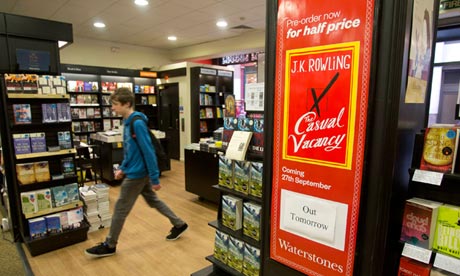The author's first book for adults features drugs, sex and swearing – things that Harry Potter probably never dreamed of.
They call it "denial marketing": the process whereby the contents of JK Rowling's books are guarded like the crown jewels until publication day. It made sense with Harry Potter, when the world and his dog wanted to know what had happened to the boy wizard and his dastardly foes. But it creates a slight anti-climax in the case of The Casual Vacancy, a novel concerning a parish council election in a small West Country town.
There are some superficial excitements here, in that the younger characters get up to things that Harry probably never dreamed of: taking drugs, swearing, self-harming, having grimy casual sex, singing along to Rihanna. The new book contains regular outbursts of four-letter words, along with the memorable phrase "that miraculously unguarded vagina" – which, leaked in a pre-publication profile, has caused a flurry of jokes on Twitter about Harry Potter and the Miraculously Unguarded Vagina.
Generally, though, The Casual Vacancy is a solid, traditional and determinedly unadventurous English novel. Set in the "pretty little town of Pagford", it is a study of provincial life, with a large cast and multiple, interlocking plots, drawing inspiration from Elizabeth Gaskell and George Eliot. The only obvious parallel with the Potter books is that, like them, it is animated by a strong dislike of mean, unsympathetic, small-minded folk. The inhabitants of Pagford – shopkeepers, window-twitchers, Daily Mail readers – are mostly hateful Muggles, more realistic versions of the Dursleys, the awful family who keep poor Harry stashed in the cupboard under the stairs. The book seems doomed to be known as Mugglemarch.
Behind its tourist-friendly façade – the hanging baskets, the war memorial, the scrubbed cottages – Pagford is of course a hot-bed of seething antagonism, rampant snobbery, sexual frustration and ill-disguised racism. The plot is set in motion when, on page five, its hero, Barry Fairbrother, falls down dead in the car park of the "smug little golf club". His death creates a "casual vacancy" on the parish council, and the forces of darkness, led by Howard Mollison, the obese delicatessen owner, see their chance to parachute in one of their own.
Full review at The Guardian
There are some superficial excitements here, in that the younger characters get up to things that Harry probably never dreamed of: taking drugs, swearing, self-harming, having grimy casual sex, singing along to Rihanna. The new book contains regular outbursts of four-letter words, along with the memorable phrase "that miraculously unguarded vagina" – which, leaked in a pre-publication profile, has caused a flurry of jokes on Twitter about Harry Potter and the Miraculously Unguarded Vagina.
Generally, though, The Casual Vacancy is a solid, traditional and determinedly unadventurous English novel. Set in the "pretty little town of Pagford", it is a study of provincial life, with a large cast and multiple, interlocking plots, drawing inspiration from Elizabeth Gaskell and George Eliot. The only obvious parallel with the Potter books is that, like them, it is animated by a strong dislike of mean, unsympathetic, small-minded folk. The inhabitants of Pagford – shopkeepers, window-twitchers, Daily Mail readers – are mostly hateful Muggles, more realistic versions of the Dursleys, the awful family who keep poor Harry stashed in the cupboard under the stairs. The book seems doomed to be known as Mugglemarch.
Behind its tourist-friendly façade – the hanging baskets, the war memorial, the scrubbed cottages – Pagford is of course a hot-bed of seething antagonism, rampant snobbery, sexual frustration and ill-disguised racism. The plot is set in motion when, on page five, its hero, Barry Fairbrother, falls down dead in the car park of the "smug little golf club". His death creates a "casual vacancy" on the parish council, and the forces of darkness, led by Howard Mollison, the obese delicatessen owner, see their chance to parachute in one of their own.
Full review at The Guardian

No comments:
Post a Comment